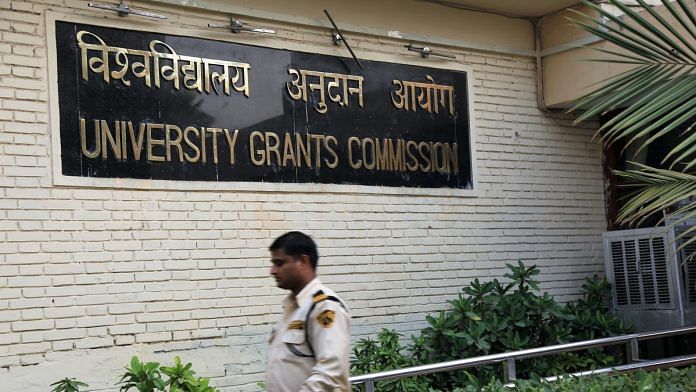New Delhi: The youth wing of Shiv Sena Friday opposed the University Grants Commission’s stand that states cannot override the panel’s guidelines to hold final-year college exams by 30 September.
During a Supreme Court hearing, the Yuva Sena said directions issued by the Disaster Management Authority (DMA) during a pandemic take precedence over the central regulator’s directive. According to its lawyer, senior advocate Shyam Divan, UGC guidelines are subordinate to the directions issued by the DMA.
Divan said no authority can dilute DMA’s directions once you have a disaster going on. “When you have elevated the right to life, you cannot have an authority coming in and saying that they will dilute the restrictions,” he argued.
The submissions were made before a bench led by Justice Ashok Bhushan that was hearing a batch of petitions that have challenged the UGC’s 6 July notification to hold the exams over a health risk to students. The Sena is among the petitioners.
Maharashtra and Delhi have instructed their universities to cancel final-year exams amid the pandemic. Their move came after suggestions from the respective states’ DMAs, according to their affidavits filed in the court.
However, the UGC has taken a stand that SDMA cannot interfere with the conduct of examinations.
As the arguments remained inconclusive, the court said it would resume the hearing on 18 August.
Also read: BA, BCom, BSc students can do internship with graduation as UGC wants them to be job-ready
‘MHA guidelines don’t allow re-opening of schools & colleges’
According to Divan, the UGC guidelines are against the Union Ministry of Home Affairs’ unlock norms that don’t allow re-opening of educational institutions. He added that the UGC notification is advisory in nature and must be tailored according to local needs.
According to his argument, the UGC has diluted MHA’s notification, while the latter does not permit the same.
“MHA has prohibited states/union territories from diluting the restrictions but has allowed them to increase additional restrictions. In such a scenario, how could the UGC issue a direction for holding exams,” Divan contended.
The senior counsel pointed to the exponential increase in Covid cases in states, including Maharashtra, and claimed that in many places colleges and educational institutions have been converted into quarantine centres.
He questioned the logic to hold exams at a time when the pandemic is only getting more severe. “On 29 April, confirmed cases were 1137. You (UGC) could not hold exams then. How would you have them now, with lakhs of cases,” Divan said. If exams could not be held in May, they cannot be held now also, he argued.
India crossed the 24-lakh mark on the Covid tally Friday, with over 48,000 deaths.
Also read: These colleges want full fees for only online classes. But students say they won’t pay
‘Students a homogenous class, notification violates Article 14’
According to Divan, the UGC notification discriminated against students on the basis of the year of their study. It permits students of intermediate year/semesters to be given promotion based on their past performance and internal examinations.
Students form a homogenous class as far as Covid risk is concerned and there cannot be discrimination among them, he said.
“Many students live with their families, with their grandparents and parents. The student might not show symptoms but they will come in contact with their families. Please have some concern for them,” Divan said.
Senior advocate Abhishek Manu Singhvi, representing a final-year law student, submitted the guidelines violated Article 14 — Right to Equality. They don’t take into account the accessibility, transport, etc. of students, he argued.
The guidelines were issued without proper application of mind, he said. If educational institutions were not permitted to open, how could the UGC allow conduct of exams, he said.
Also read: AICTE more than doubles scholarships for women in engineering courses from this year



